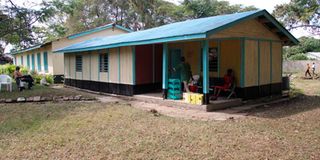Homa Bay fails to launch county GBV policy

A GBV recovery centre at Homa Bay County Teaching and Referral Hospital on November 23, 2021. Anti-GBV advocates have revived calls for creation of adequate shelters to provide emergency care to violated survivors. This even as Homa Bay County failed to launch a GBV policy to guide response and interventions.
What you need to know:
- Officials from different non-governmental organisations, including Population Services Kenya, Lake Region Community Development, and Plan International, converged at Sena Hospital for the launch.
- There was a last-minute change of plans, with Nation.Africa establishing that this was due to lack of involvement of members of the county assembly.
Homa Bay County has suspended the planned adoption of a sexual and gender-based violence (SGBV) policy, despite pleas by activists, who say it would help vulnerable groups overcome social challenges.
During the 16 Days of Activism against GBV that ended on Saturday, most stakeholders, especially groups involved in protecting the rights of women and girls, said the policy would be a game changer in addressing SGBV and teenage pregnancies.
The document details recourse for victims. It had been established that the county, despite being among the leading in GBV and teenage pregnancies, has a lot of policy gaps that compromise administration of justice. The document, therefore, sought to fix the gaps and was ready for launch on Mfangano Island on Human Rights Day (December 10).
Officials from different non-governmental organisations, including Population Services Kenya, Lake Region Community Development, and Plan International, gathered at Sena Hospital for the launch, only to be informed of the last-minute change of plans. Nation.Africa established that this was due to lack of involvement of members of the county assembly.
Banners had been made for the exercise, with T-shirts printed out with messages meant to fight SGBV. A programme was made detailing how the event would proceed, with Governor Gladys Wanga listed as the one to preside over the launch. But a call was made to the groups to suspend the process.
County Gender Executive Sarah Malit said the document must pass through another step before it is adopted and launched.
County Gender Technical Working Group vice chairperson Julius Omuga, however, dismissed claims that the policy has not passed through the House. He said members of the county assembly who served in the second house between 2017 and 2022 were involved in drafting the policy.
“Once members approve the document, the process should end there. There is no need for other MCAs to start the process afresh,” he said.
Second postponement
According to Mr Omuga, the launch should have taken place earlier this year but was pushed back because of limited funds. “It is costly to print the document and organise for the event only for us to be told not to proceed.”
Mr Omuga said his group had consulted experts who advised them that the document is still valid and what is contained in it can be implemented.
Women rights advocates said the county is in a red zone and things have to be straightened up.
Ms Hellen Oromo, the programme coordinator at Lake Region Community Development, said the prevalence of GBV is still high. She attributed the problem to lack of information in addressing the challenges.
“People don't know the extent to which human rights are abused. Some do it as a tradition like beating their wives, but it is wrong," she said.
The activists also raised the alarm over separation and divorce that drive some families to GBV.
Ms Zahra Hassan, the chairperson of Gender Sector Working group, attributed economic vulnerability as the major driver of GBV in Homa Bay. She said economic empowerment in households is the best solution to the problem.
“Financial freedom and education are among the solutions to this problem. Both men and women should be involved in this,” she said.
Ms Hassan also called for a timely response to GBV, saying slow action from security and health officers has led to perpetrators interfering with evidence, hence getting scot-free.
They also expressed concern that Homa Bay has only one gender recovery centre at the county referral hospital to offer psychosocial support. Ms Hassan proposed that similar units be set up in every sub-county.
“We need to ensure the hard work we have put in addressing social challenges does not go down the drain,” she said.
County Children’s Services director Peter Kutere called for joint efforts to eliminate challenges faced by children. He said failure by government arms to collaborate interferes with how cases are being handled.
“Some suspects collude with perpetrators to solve the issues at home. This has been the main challenge that we face and hope to deal with it," Mr Kutere said.
Behaviour change
As the county government waits for the policy to be officially put to use, Population Services Kenya is drafting another document, Social and Behaviour Change Communication Strategy, to provide guidelines and strategies for implementing GBV intervention.
Population Services Kenya behaviour change and community engagement coordinator Charles Orora said the document aims to increase sexual and reproductive health knowledge and service uptake, with special focus on poor and marginalised women and adolescents.
The project further seeks to address GBV such as female genital mutilation, targeting to engage victims, especially women and girls, perpetrators and duty-bearers (care providers, administration, and community leadership) through specific approaches.
The project will contribute towards ICPD25 Promise of zero unmet need for contraception, zero preventable maternal deaths and zero GBV and harmful practices.
Governor Wanga said her administration would do everything it can to protect women’s and girls’ rights. She expressed concern about the high number of GBV cases and called for proper and urgent interventions.




